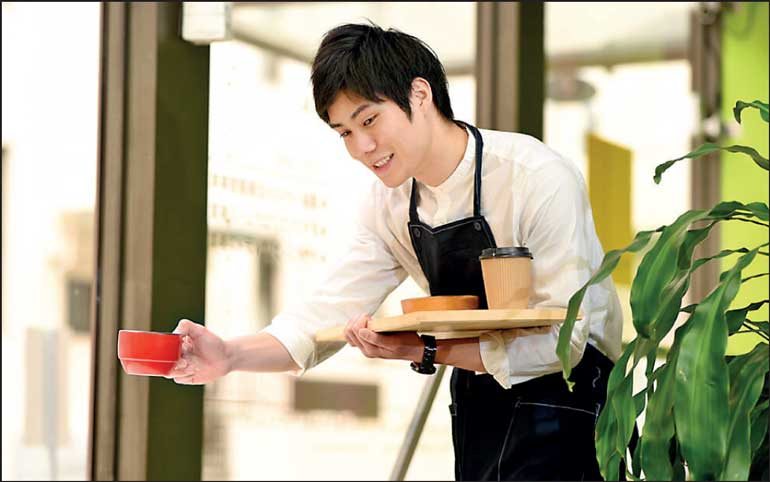Sunday Feb 22, 2026
Sunday Feb 22, 2026
Wednesday, 4 October 2023 00:00 - - {{hitsCtrl.values.hits}}

Omotenashi is more than just good service; it’s a philosophy that seeks to anticipate and fulfil the needs of others
 Introduction
Introduction
We wrongly believe our Sri Lankan customer service is good because our smile is world-famous. We need to go beyond the smile. That is why we need to adopt Omotenashi. In all my travels to every continent, I have never found a level of hospitality and customer service superior to Japan. Omotenashi is more than just good service; it’s a philosophy that seeks to anticipate and fulfil the needs of others, creating a memorable and enriching experience.
In my first trip to Japan in 1980 and over 35 visits after that, Japanese hospitality has never failed to amaze me. It is the genuine warmth, attention to detail, and a genuine desire to ensure the visitor’s or customer’s comfort that amazes me. It is, therefore, even more frustrating when I land in Colombo after experiencing the super service received in Japan.
This article briefly introduces Omotenashi; readers can find more information online. If you visit Japan, you will experience Omotenashi from the time you land at the airport.
The meaning of Omotenashi
Omotenashi, derived from the words “omote” (public face) and “nashi” (nothing), and translates to “selfless hospitality” or “wholehearted service.” It embodies the idea of serving others without expecting anything in return. That is why tipping in Japan is considered rude. Japanese consider it their obligation to provide the best service without expecting anything in return. It goes beyond mere courtesy; it’s about genuinely connecting with people and creating a positive emotional experience.
Key elements of Omotenashi
The first is that the other person should be considered a priority. This is why you will never find anyone blocking a pathway, a door, an elevator, a bus entrance or a train door. Next is anticipating another’s need, particularly a customer’s need. The best-arranged hotel rooms are in Japan, where the designer has ensured the customer’s convenience. When I travel to Japan, and our Japanese shareholder’s car picks me up, the driver enters the airport and carries my bags, and getting into the car, I find a wet towel, water, juices, and even the day’s newspaper. He considers it a privilege to be able to make me comfortable. When the Japanese come to Sri Lanka, my driver finds it infra dig to carry his bag!
Attention to detail is next. Japanese hospitality is synonymous with precision and attention to even the minutest of details. The documentation, agendas, and instructions are exact, leaving nothing more to inquire or doubt. Warmth and respect are other elements. The Japanese would go the extra mile to treat you and ensure your comfort in your office, restaurant or shop. They show respect with their traditional bow. Even a bus driver will bow to all passengers before he takes his seat. The lift operator will keep on bowing as and when a passenger gets on.
The next element is Unobtrusive and Discreet Service. They will attend to all your needs but remain unobtrusive, allowing guests and customers their freedom.
Examples of Omotenashi
As soon as you enter a restaurant, you hear the shouts of Irasshaimase. That’s a welcome greeting shouted by all the staff. You are then served with genuine feelings. When you leave, all the staff will say Arigatou Gozaimas, meaning Thank You.
At a mall, at the end of the day, all the staff on the floor line up and bow to each customer as they make their way out. On the ground floor, you are once again greeted with a bow as you leave the premises.
Once, when I had to leave early for a flight, on leaving the room I phoned the reception asking them to have my bill ready and that I am checking out. Surprisingly, I found the lift had been stationed on my floor. The reception staff has done that to ensure my convenience.
Cleanliness is maintained to ensure there is no discomfort to any guest. Once, my Home Stay family came to see me in my hotel. They brought fruits, peeled them straight into a tiny garbage bag, completely cleaned the lobby table, and returned home with the garbage. There was no trace of anyone having occupied the place. Leaving the place dirty would be a no-no.
I believe Omotenashi cannot be drilled into Sri Lankan people by training alone. We must revisit our ancient culture of looking after guests and customers.
(The writer is a Consultant on Productivity and Japanese Management Techniques.)